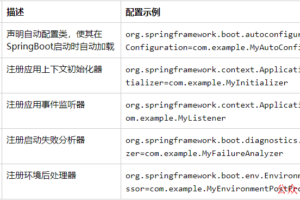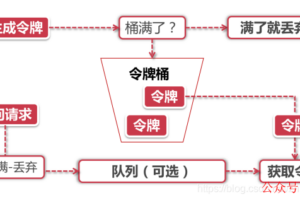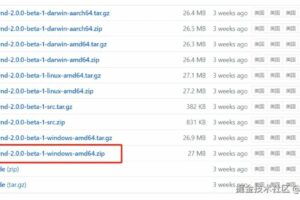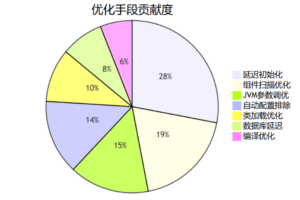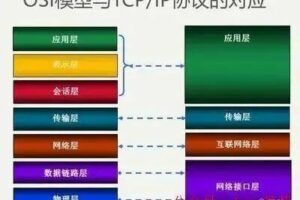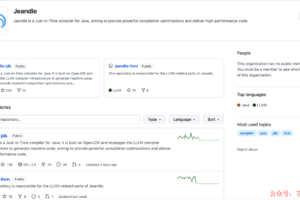Apache Geode(以前称为 GemFire)是一个开源的、分布式内存数据管理系统,支持大规模、高可用性的数据管理和实时分析,并且结合了内存存储的速度和传统数据库的强大功能。
哪些公司使用了Geode?
-
UnitedHealth Group 利用 Apache Geode 进行大规模医疗数据的存储和分析,支持其健康管理服务。 -
Salesforce 利用 Apache Geode 提供高效的客户数据管理,支持个性化营销活动。 -
Verizon 使用 Apache Geode 实时监控其网络基础设施,并进行优化,确保服务质量。 -
Wells Fargo 在其客户服务系统和风险管理流程中采用了 Apache Geode,以提高数据访问速度和准确性。 -
PayPal 使用 Apache Geode 处理大量支付交易,并进行实时风险管理。 -
Ford 使用 Apache Geode 进行车辆数据的实时监控和故障诊断,提高汽车性能和安全性。 -
Expedia Group 使用 Apache Geode 实现实时数据处理和推荐系统,以优化酒店预订流程。 -
eBay 利用 Apache Geode 提供快速的搜索和个性化推荐功能,提升用户体验。 -
Cisco 使用 Apache Geode 来实时监控网络设备的状态,并进行优化。 -
Bank of America 在其客户服务系统和风险管理流程中采用了 Apache Geode,以提高数据访问速度和准确性。 -
American Express 使用 Apache Geode 进行实时数据分析,帮助识别欺诈行为并管理风险。 -
Zillow 使用 Apache Geode 提供快速的房地产数据访问和个性化推荐功能,提升用户体验。
我们为什么选择Geode?
-
低延迟:Apache Geode 是一个内存数据网格(IMDG),能够在内存中存储和处理数据,提供极低的读写延迟,这对于需要快速响应的应用程序至关重要。 -
高吞吐量:支持高并发的数据访问和事务处理,能够处理大量的请求而不会显著降低性能。 -
分布式架构:Geode 的分布式特性确保数据在多个节点之间复制,即使某个节点发生故障,其他节点仍然可以继续提供服务,保证系统的高可用性。 -
自动故障转移:内置的故障转移机制可以在节点失效时自动切换到备用节点,减少停机时间。 -
持久化选项:支持多种持久化策略,包括磁盘持久化和异步写入,确保数据在重启后不会丢失。 -
备份和恢复:提供强大的备份和恢复功能,保障数据的安全性和完整性。 -
事件驱动模型:支持复杂的事件处理和流式数据处理,适合需要实时分析和响应的应用场景。 -
持续查询:可以通过连续查询(CQ)实现实时数据订阅和通知,及时获取最新的数据变化。
应用场景
电信行业
-
客户关系管理:实时管理和分析客户数据,提升客户服务体验。 -
网络优化:优化网络资源配置,提高网络性能和稳定性。
医疗保健
-
患者记录管理:实时访问和更新患者的电子健康记录。 -
远程监控:监测患者的生理指标,及时采取措施。
物流与供应链管理
-
跟踪与追溯:实时追踪货物位置和状态,提高透明度。 -
库存优化:根据需求预测调整库存水平,减少浪费。
游戏开发
-
玩家状态管理:实时保存和恢复玩家的游戏进度。 -
在线竞技:支持多人在线游戏的实时数据同步和匹配。
社交网络
-
用户资料管理:高效存储和检索用户的个人资料信息。 -
好友关系管理:快速处理和查询用户之间的社交关系。
移动应用后端
-
离线支持:为移动应用提供本地缓存,支持离线操作。 -
推送通知:实时发送推送通知,增强用户体验。
智能电网
-
能源管理:实时监控和管理电力消耗和生产。 -
故障检测:自动检测和诊断电网故障,提高可靠性。
工业自动化
-
传感器数据处理:实时处理来自传感器的数据,支持智能制造。 -
过程控制:自动化生产和制造过程,提高效率和质量。
代码实操
<project xmlns="http://maven.apache.org/POM/4.0.0"
xmlns:xsi="http://www.w3.org/2001/XMLSchema-instance"
xsi:schemaLocation="http://maven.apache.org/POM/4.0.0 http://maven.apache.org/xsd/maven-4.0.0.xsd">
<modelVersion>4.0.0</modelVersion>
<groupId>com.example</groupId>
<artifactId>social-platform-cache</artifactId>
<version>1.0-SNAPSHOT</version>
<!-- 继承 Spring Boot 的父项目配置 -->
<parent>
<groupId>org.springframework.boot</groupId>
<artifactId>spring-boot-starter-parent</artifactId>
<version>2.7.5</version>
</parent>
<!-- 设置 Java 版本 -->
<properties>
<java.version>1.8</java.version>
<geode.version>1.15.0</geode.version>
</properties>
<!-- 添加依赖项 -->
<dependencies>
<!-- Spring Boot Web 启动器 -->
<dependency>
<groupId>org.springframework.boot</groupId>
<artifactId>spring-boot-starter-web</artifactId>
</dependency>
<!-- Spring Data GemFire -->
<dependency>
<groupId>org.springframework.data</groupId>
<artifactId>spring-data-gemfire</artifactId>
<version>2.7.5</version>
</dependency>
<!-- Apache Geode 核心库 -->
<dependency>
<groupId>org.apache.geode</groupId>
<artifactId>geode-core</artifactId>
<version>${geode.version}</version>
</dependency>
<!-- Apache Geode 客户端库 -->
<dependency>
<groupId>org.apache.geode</groupId>
<artifactId>geode-client</artifactId>
<version>${geode.version}</version>
</dependency>
<!-- 测试依赖项 -->
<dependency>
<groupId>org.springframework.boot</groupId>
<artifactId>spring-boot-starter-test</artifactId>
<scope>test</scope>
</dependency>
</dependencies>
<!-- 构建插件配置 -->
<build>
<plugins>
<!-- Spring Boot Maven 插件 -->
<plugin>
<groupId>org.springframework.boot</groupId>
<artifactId>spring-boot-maven-plugin</artifactId>
</plugin>
</plugins>
</build>
</project>
application.properties
# Geode 定位器地址和端口
spring.data.gemfire.cache.client.locators=localhost[10334]
# 连接池名称
spring.data.gemfire.pool.name=ClientPool
# 区域名称
spring.data.gemfire.region.name=UserProfiles
# 区域类型(复制代理)
spring.data.gemfire.region.type=REPLICATE_PROXY
实体类
package com.example.socialplatformcache.model;
import org.springframework.data.annotation.Id;
import org.springframework.data.gemfire.mapping.Region;
// 指定该实体存储在名为 UserProfiles 的区域中
@Region("UserProfiles")
public class UserProfile {
// 用户ID,作为主键
@Id
private String userId;
// 用户姓名
private String name;
// 用户邮箱
private String email;
// 用户简介
private String bio;
public String getUserId() {
return userId;
}
public void setUserId(String userId) {
this.userId = userId;
}
public String getName() {
return name;
}
public void setName(String name) {
this.name = name;
}
public String getEmail() {
return email;
}
public void setEmail(String email) {
this.email = email;
}
public String getBio() {
return bio;
}
public void setBio(String bio) {
this.bio = bio;
}
}
Repository
package com.example.socialplatformcache.repository;
import com.example.socialplatformcache.model.UserProfile;
import org.springframework.data.repository.CrudRepository;
public interface UserProfileRepository extends CrudRepository<UserProfile, String> {
}
Service
package com.example.socialplatformcache.service;
import com.example.socialplatformcache.model.UserProfile;
import com.example.socialplatformcache.repository.UserProfileRepository;
import org.springframework.beans.factory.annotation.Autowired;
import org.springframework.stereotype.Service;
// 定义一个服务类,用于处理用户资料相关的业务逻辑
@Service
public class UserProfileService {
// 自动注入 UserRepository
@Autowired
private UserProfileRepository userProfileRepository;
// 根据用户ID获取用户资料
public UserProfile getUserProfileById(String userId) {
return userProfileRepository.findById(userId).orElse(null);
}
// 保存或更新用户资料
public UserProfile saveUserProfile(UserProfile userProfile) {
return userProfileRepository.save(userProfile);
}
// 根据用户ID删除用户资料
public void deleteUserProfile(String userId) {
userProfileRepository.deleteById(userId);
}
}
Controller
package com.example.socialplatformcache.controller;
import com.example.socialplatformcache.model.UserProfile;
import com.example.socialplatformcache.service.UserProfileService;
import org.springframework.beans.factory.annotation.Autowired;
import org.springframework.web.bind.annotation.*;
@RestController
@RequestMapping("/api/userprofiles")
public class UserProfileController {
@Autowired
private UserProfileService userProfileService;
// 根据用户ID获取用户资料
@GetMapping("/{userId}")
public UserProfile getUserProfile(@PathVariable String userId) {
return userProfileService.getUserProfileById(userId);
}
// 创建或更新用户资料
@PostMapping("/")
public UserProfile createUserProfile(@RequestBody UserProfile userProfile) {
return userProfileService.saveUserProfile(userProfile);
}
// 根据用户ID删除用户资料
@DeleteMapping("/{userId}")
public void deleteUserProfile(@PathVariable String userId) {
userProfileService.deleteUserProfile(userId);
}
}
Application
package com.example.socialplatformcache;
import org.springframework.boot.SpringApplication;
import org.springframework.boot.autoconfigure.SpringBootApplication;
// 主应用程序类,启用 Spring Boot 自动配置
@SpringBootApplication
public class SocialPlatformCacheApplication {
// 应用程序入口点
public static void main(String[] args) {
SpringApplication.run(SocialPlatformCacheApplication.class, args);
}
}
测试
创建用户资料
curl -X POST http://localhost:8080/api/userprofiles/ \
-H "Content-Type: application/json" \
-d '{"userId": "user1", "name": "John Doe", "email": "john.doe@example.com", "bio": "Software Developer"}'
Respons:
{
"userId": "user1",
"name": "John Doe",
"email": "john.doe@example.com",
"bio": "Software Developer"
}
获取用户资料
curl -X GET http://localhost:8080/api/userprofiles/user1
Respons:
{
"userId": "user1",
"name": "John Doe",
"email": "john.doe@example.com",
"bio": "Software Developer"
}
更新用户资料
curl -X POST http://localhost:8080/api/userprofiles/ \
-H "Content-Type: application/json" \
-d '{"userId": "user1", "name": "John Doe", "email": "john.doe@example.com", "bio": "Updated Bio"}'
Respons:
{
"userId": "user1",
"name": "John Doe",
"email": "john.doe@example.com",
"bio": "Updated Bio"
}
再次获取用户资料以验证更新
curl -X GET http://localhost:8080/api/userprofiles/user1
Respons:
{
"userId": "user1",
"name": "John Doe",
"email": "john.doe@example.com",
"bio": "Updated Bio"
} 微信赞赏
微信赞赏 支付宝扫码领红包
支付宝扫码领红包
声明:本站所有文章,如无特殊说明或标注,均为本站原创发布。任何个人或组织,在未征得本站同意时,禁止复制、盗用、采集、发布本站内容到任何网站、书籍等各类媒体平台。如若本站内容侵犯了原著者的合法权益,可联系我们进行处理。侵权投诉:375170667@qq.com



